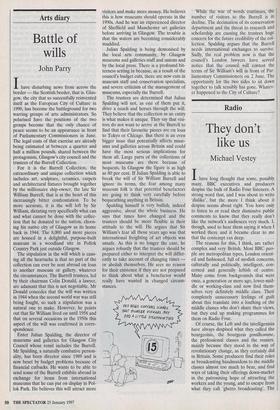Arts diary
Battle of wills
John Parry
Ihave disturbing news from across the border — the Scottish border, that is. Glas- gow, the city that so successfully reinvented itself as the European City of Culture in 1990, has become the battleground for two warring groups of arts administrators. So polarised have the positions of the two groups become that the only chance of peace seems to be an appearance in front of Parliamentary Commissioners in June. The legal costs of that exercise are already being estimated at between a quarter and half a million pounds, shared between the protagonists, Glasgow's city council and the trustees of the Burrell Collection.
For it is the Burrell Collection, the extraordinary and unique collection which includes art, sculpture, ceramics, carpets and architectural fixtures brought together by the millionaire ship-owner, the late Sir William Burrell, that is at the heart of this increasingly bitter confrontation. To be more accurate, it is the will left by Sir William, dictating very specifically what can and what cannot be done with the collec- tion that he donated to the nation, choos- ing his native city of Glasgow as its home back in 1944. The 8,000 and more pieces are housed in a delightful, purpose-built museum in a woodland site in Pollok Country Park just outside Glasgow.
The stipulation in the will which is caus- ing all the heartache is that no part of the collection can ever be sent abroad on loan to another museum or gallery, whatever the circumstances. The Burrell trustees, led by their chairman Cohn Donald, a lawyer, are adamant that this is not negotiable. Mr Donald concedes that the will was written in 1944 when the second world war was still being fought, so such a stipulation was a natural one to make. However, he points out that Sir William lived on until 1958 and that on several occasions in the 1950s this aspect of the will was confirmed in corre- spondence.
Enter Julian Spalding, the director of museums and galleries for Glasgow City Council whose remit includes the Burrell. Mr Spalding, a naturally combative person- ality, has been director since 1989 and is now beset by budget problems because of financial cutbacks. He wants to be able to send some of the Burrell exhibits abroad in exchange for items from international museums that he can put on display in Pol- lok Park. He believes this will attract more visitors and make more money. He believes this is how museums should operate in the 1990s. And he was an experienced director of Sheffield and Manchester art galleries before arriving in Glasgow. The trouble is that the waters are becoming considerably muddied.
Julian Spalding is being demonised by the local arts community, by Glasgow museums and galleries staff and unions and by the local press. There is a profound bit- terness setting in because, as a result of the council's budget cuts, there are now cuts in museum staff and conservation specialists, and severe criticism of the management of museums, especially the Burrell.
The trustees are determined that Julian Spalding will not, as one of them put it, drive a coach and horses through the will. They believe that the collection as an entity is what makes it unique. They say that visi- tors do not want to arrive at the Burrell to find that their favourite pieces are on loan to Tokyo or Chicago. But there is an even bigger issue that potentially affects muse- ums and galleries across Britain and could have the most serious implications for them all. Large parts of the collections of most museums are there because of bequests. In Glasgow the figure is as high as 80 per cent. If Julian Spalding is able to break the will of Sir William Burrell and ignore its terms, the fear among many museum folk is that potential benefactors are going to think very carefully before bequeathing anything in Britain.
Spalding himself is very bullish, indeed aggressive, about the whole business. He says that times have changed and the trustees should be more flexible in their attitude to the will. He argues that Sir William's fear all those years ago was that international freighting of art objects was unsafe. As this is no longer the case, he argues robustly that the trustees should be prepared either to interpret the will differ- ently to take account of changing times or abolish themselves. He sees no reason for their existence if they are not prepared to think about what a benefactor would really have wanted in changed circum- stances. While the war of words continues, the number of visitors to the Burrell is in decline. The decimation of its conservation department and the threat to research and scholarship are causing the trustees huge concern for the future credibility of the col- lection. Spalding argues that the Burrell needs international exchanges to survive. Sadly, the real problem now is that the council's London lawyers have served notice that the council will contest the terms of Sir William's will in front of Par- liamentary Commissioners on 2 June. The opportunity for the two sides to sit down together to talk sensibly has gone. Whatev- er happened to the City of Culture?


































































 Previous page
Previous page